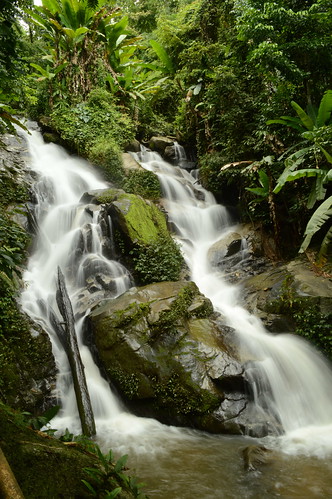A few weeks ago I was looking at some travel information and I saw a picture of a waterfall. When I read the details about it, I found out it was called Huai Kaew waterfall and it is in Chiang Rai province.
So yesterday, while we came to Chiang Rai on business, we decided to detour to check out the waterfall.
The travel distance was about 20 kilometers but Google maps said the driving time was just over an hour without traffic.
Just over an hour! Why!
Oh--
that's why.
The last 6 kilometers we drove up and then down a very steep road which was only one lane wide and had lots of blind corners. There were very few places to pull over and so we hoped we would not meet up with any four-wheeled vehicles, as it would likely mean backing up a long distance to a wide spot on the road.
So while on the one hand I wanted to drive very fast in order to: 1) minimize the amount of time I was on the road and therefore reduce opportunity for meeting up with another vehicle, and 2) try to get there and back to the two lane road before the impending storm hit.
However, it was necessary to drive slow so that: 1) I wouldn't hit any vehicles going around blind corners, and 2) I wouldn't lose control and drive off the pavement which would result in serious damage to the vehicle and its contents.
Due to all of this, I was rather intently focused on the road and so was not paying very much attention to things not related to that. I'm sure there was some really nice scenery. I might have taken a photo if there was a place to pull over and park the car--but there wasn't.
We ended up parking about 1 kilometer from the waterfall because the pavement ended and the road condition beyond that was not very good. But the walk up to the waterfall was well worth it. We passed through a tea plantation being run by the Akha people who live there. At the falls, the piercing whine of the cicadas added to the roar coming from the water as it tumbled over the rocks. I wish we could have stayed longer and just enjoyed the natural sights and sounds and smells, but the dark clouds above were roaring out their plans for the near future, and I wasn't too excited about them.
So we rushed back to the truck. The rain started falling gently while we were on the downhill stretch. Fortunately, the heavy stuff did not come until we were back on the two-lane road. All-in-all, it was a fun adventure.
Sometimes life can be kind of like our trip to Huai Kaew waterfall..
Just a couple of weeks ago, my brother-in-law was being examined for a suspected--and verified--kidney stone. While performing the scan, the physician noticed some signs for what appear to be a fairly advanced cancer. But without any other symptoms, it was not even known what the source was.
All of the sudden George and Dawn's lives have become like driving a narrow, mountain road, with much of their attention very focused on figuring out what is happening with George's body.
Please pray:
1) for skill in navigating the course ahead
2) for places along the way to pull of the road and enjoy the view
3) that they won't encounter "vehicles" causing them to have to back up and start over
4) for some pretty waterfalls along the way
5) that they will finish the course before the heavy rains hit.
You can follow their journey
here.
O my soul, bless GOD.
From head to toe, I'll bless his
holy name!
O my soul, bless GOD,
don't forget a single blessing!
He forgives your sins—every one.
He heals your diseases—every one.
He redeems you from hell—saves your
life!
He crowns you with love and mercy—a
paradise crown.
He wraps you in goodness—beauty
eternal.
He renews your youth—
you're always young in his presence.
GOD makes everything come out right;
he puts victims back on their feet.
He showed Moses how he went about
his work,
opened up his plans to all Israel.
GOD is sheer mercy and grace;
not easily angered, he's rich in
love.
He doesn't endlessly nag and scold,
nor hold grudges forever.
He doesn't treat us as our sins
deserve,
nor pay us back in full for our
wrongs.
As high as heaven is over the earth,
so strong is his love to those who
fear him.
And as far as sunrise is from
sunset,
he has separated us from our sins.
As parents feel for their children,
GOD
feels for those who fear him.
He knows us inside and out,
keeps in mind that we're made of
mud.
Men and women don't live very long;
like wildflowers they spring up and
blossom,
But a storm snuffs them out just as
quickly,
leaving nothing to show they were
here.
GOD's love, though, is ever and always,
eternally present to all who fear
him,
Making everything right for them and
their children
as they follow his Covenant ways and
remember to do whatever he said.
GOD has set his throne in heaven;
he rules over us all. He's the King!
So bless GOD, you angels, ready and able to fly at his bidding,
quick to hear and do what he says.
Bless GOD, all you armies of angels,
alert to respond to whatever he
wills.
Bless GOD, all creatures, wherever you are—
everything and everyone made by GOD.
And you, O my soul, bless GOD!
Psalm
103:1-22 (MSG)
 |
| Huai Kaew Waterfall, just west of Chiang Rai |





























